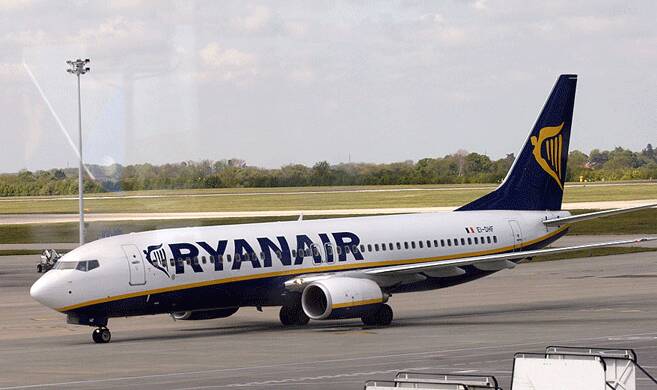This article condenses a full interview by Professor Alemanno, which can be found in its podcast form at Knowledge@HEC.
Belarusian activists Roman Protasevich and Sofia Sapega were detained by their government after their Ryanair flight was intercepted by a Belarusian fighter jet and forced to land in the capital Minsk. As a result, the European Union has been preparing sanctions on Belarus’ economy, several of the country’s top officials, as well as airspace restrictions on the Belavia national carrier.
But what consequences do such measures have on the former Soviet Republic? Alberto Alemanno, Jean Monnet Professor of European Law Policy at HEC Paris, has been researching the EU and political inequalities within European societies for almost two decades. He believes the forced landing of Ryanair flight 4978 between Athens and Vilnius is “the ultimate test case for the credibility of the EU foreign policy on both the world and EU stage.” So how does he respond to this fourth round of EU sanctions since President Alexander Lukashenko repressed popular protest last year? “The European Union response to the Belarus hijack is unprecedently swift. But it didn’t translate into sanctions capable of affecting the Lukashenko regime. Rather, they embolden (the President’s) own take on Western reaction. They are pushing Lukashenko closer to Russia, making Russia’s voice louder and more necessary within Belarusian civil society. So I remain very skeptical about the ability of the EU, through its own sanctions, to change anything.”
The European Union response to the Belarus hijack is unprecedently swift. But it didn’t translate into sanctions capable of affecting the Lukashenko regime.
Core European Values Being Challenged
Alemanno feels that the Ryanair interception and subsequent incarceration of two young Belarusians will test one of the EU’s core values. And he cautions against double standards: “Europe has been preaching that multilateralism is the way forward and has to be preserved, together with the respect of the rule of law. But, at the same time, the EU - if you remember the agreement made with China recently (the ratification of this investment deal was frozen on May 20, Ed.) - shows some pragmatism, some even say cynicism, in dealing with external regimes and applying to them very different standards to the ones they claim to apply outside the EU.”
The author of “The Case for Citizen Participation in the European Union” is concerned about the divisions among EU states: “I don’t think it’s easy for 27 EU leaders, with very different interests and history regarding Belarus in general, to reach an agreement on sanctions. We saw the divisions during the 11-day war in Israel/Palestine recently, and we’re set to see it happening again – it’s very difficult for 27 nations to speak together on these issues.”
Ambivalent Leadership
Alemanno points to the cracks that have appeared recently when dealing with conservative evolutions in eastern Europe: “Over the last few years, regimes in Poland, Hungary and Belarus have really questioned the independence of the judiciary and the media in these countries. This is spreading into Slovenia and Bulgaria. At the same time, the EU, and especially the European Commission led by Ursula von der Leyen, shows very little appetite to go after these countries – despite having the prerogative, even obligation, to uphold the rule of law and principles within the EU.”
He elaborates, linking the Commission to the EU governance: “The ambivalent leadership of (German Chancellor) Angela Merkel exemplifies this. She’s been well intentioned in embracing a rhetorical devotion to a rules-based international system. But, at the same time, she has been extremely driven by the economic interests of Germany. These have transformed Poland, Hungary, the Czech Republic and other central European countries into de facto colonies of Germany’s industries, with low wages and favorable conditions for its automotive industry. This explains why German interests do not uphold the rule of law but turn a blind eye and even champion leaders like Viktor Orban. It’s therefore no exaggeration to claim that Angela Merkel has been a de facto accomplice to both Poland and Hungary and, nowadays, indirectly to Belarus and even Russia.”
Optimism in Popular-driven Change for EU
Despite these challenges, Alemanno remains upbeat about the long-term evolution of EU foreign policy and its decision-making system in general. His research tackles issues related to the inability of the EU infrastructure to give voice to citizens across borders and be accountable to its voters: “I remain hopeful and I think that all the major transformations we’re undergoing as a society in Europe will play the role of unveiling limits in the Union and will push further European integration. Or, at least, it will force European leaders to address new questions and provide answers that are a bit more credible than those provided so far.”
Professor Alemanno’s research tackles issues related to the inability of the EU infrastructure to give voice to citizens across borders and be accountable to its voters.
As we go to press, the EU governments say they are seeking to target sectors in the Belarus economy that play a central role, in order to inflict “real punishment on President Alexander Lukashenko”. These could include the oil sector and potash and bond sales. Meanwhile, according to diplomats, the EU foreign ministers are to meet on June 21 to begin implementing a smaller sanctions list on individuals.








